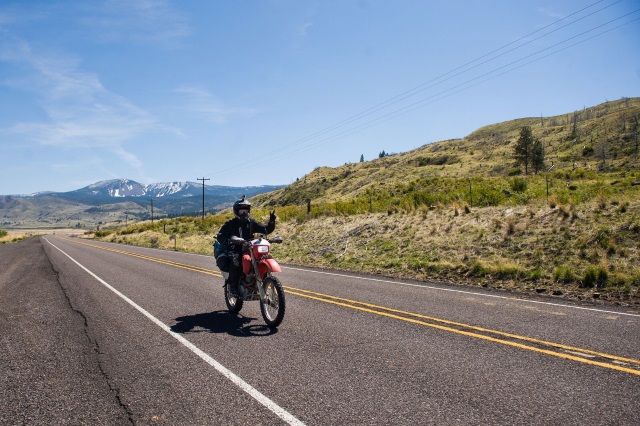
The very idea of Dual Sport often means camping for those who partake because if you can ride a motorcycle to the middle of nowhere and back you might as well stay a while.
Riding to a camping destination offers a much different experience then driving. A car or truck affords you room to bring just about everything except the kitchen sink. Dual Sport requires packing as much as possible but as light as possible in a confined space so it comes with severe limitations. Basically, you get a backpack to wear, saddlebags for the bike and perhaps a tank or handlebar bag. If you don't have luggage then get some or consider any Dual Sport outing a day-long trip.
Riding gear goes without saying, of course, assuming if a Dual Sport Camping trip highlights a summer vacation then you ride proficiently meaning you already have a helmet, boots, jacket, riding pants and the like. If you don't have riding gear then get some or consider any Dual Sport outing merely a dream as you nap on the couch. Link at the beginning of this paragraph takes you to all things Dual Sport.
The length of travel and your personality profile help determine the needed supplies to make the camping part more enjoyable. Minimalists need little accessories, and riding to a specific place then staying put verses packing up every morning and moving on makes you think twice about what to bring and what not to bring. Including general stores or other roadside merchants along your path of travel helps, if available, especially on long runs like the more scenic Backcountry Discovery Routes system set up in several states. Eventually, food and gas run out and seeing a bit of civilization might help push you further along the trails if you miss that part of your life.
The bottom line: Making the most of the little bit of space is huge. It's not fun to ride with a heavily loaded bike and backpack.
Before you go anywhere you need food and water and enough to last the duration of your trip. Remember, riding a motorcycle expends energy. You will get thirsty and hungry. The following food items make the breakfast, lunch and dinner menus of dual sport campers:
- Beef jerky
- MREs
- Nutrition bars
- Canned goods
As for water, carrying five gallon containers takes up lots of room, adds significant weight and forces you to ration. Eliminate all this with a water purification system that removes bacteria, cysts and other microbes that would otherwise cut your trip short but likely end any constipation problems along the way.
Now that you have adequate provisions let's focus on making this camping trip full of fun and adventure preventing any need to head home early. Check the weather. Hot days, cold nights? Rain in the forecast? All this determines your sleeping arrangements. At a minimum bring:
- Tarp
- Sleeping bag or cot
- Small tent or sleep under the stars
Tools get you out of a jam, get you into jam (if you brought some) and help bury stuff - your stuff. Most camping tools come compact so they don't take up a lot of room:
- Utensils
- Knife or small hatchet
- Collapsible shovel
- Can opener
If room allows you can step up the gourmet food fare and bring along a small gas stove and cooking pan. Bring waterproof matches or a lighter which also help start a camp fire. The camp fire can second as a cooking source if you leave the stove at home. Bring a flashlight, headlamp or lantern along with an extra set of batteries.
Finally, consider some self-preservation and self-defense items. Dual Sport riding takes you where most people don't go and wild animals roam including bears and cougars. Bring high-strength pepper spray or a handgun with an extra magazine. Also include these in your travel bags:
- Bug spray
- Map and compass
- GPS
- Trash bags
- First aid kit
- Money (for park fees and if you find that general store)
Check out our entire line of Dual Sport camping gear (here) which includes most of the above and more.
Consider this a guide to help get you started. Don't forget replacement parts for the bike like new tubes, tire pump and chain. If enough room remains consider any nice-to-haves you might want. Expect to forget something especially when planning a Dual Sport camping adventure for the first time. Just keep a note of what you missed and include it next time.
Lastly, let family and friends know your planned route. If something goes wrong rescue personnel can at least narrow the search field and hopefully find you sooner rather than too late.












